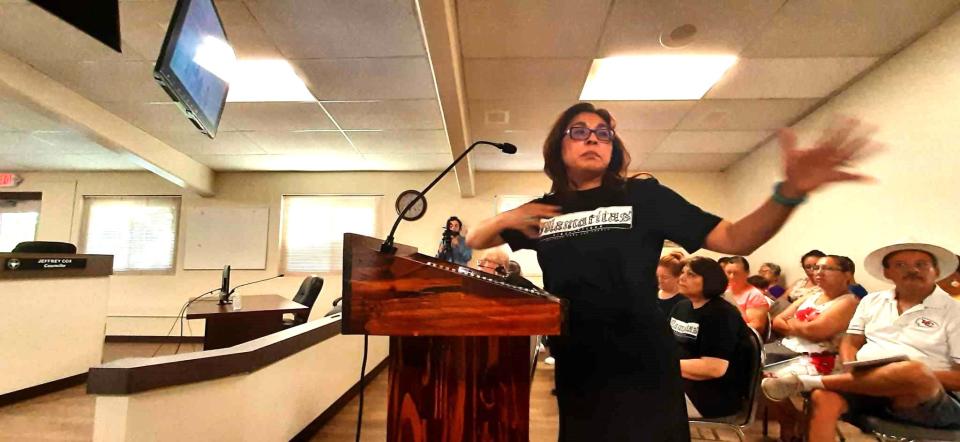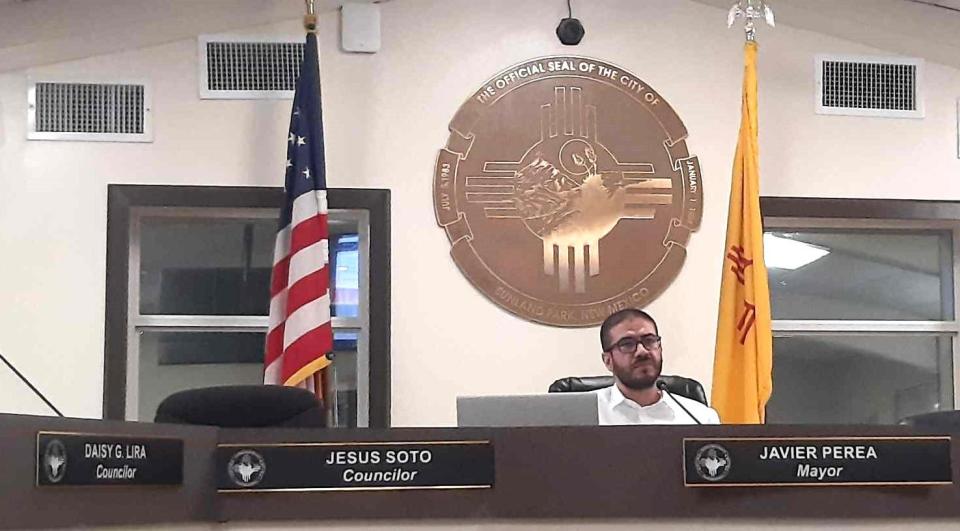Digital literacy a big need in southern Doña Ana County, report says
SUNLAND PARK – When the pandemic first hit and students were forced to learn remotely, the depth of a digital divide in southern Doña Ana County quickly became apparent, as parents and other caregivers struggled to help their kids both access high-speed internet and navigate the online realm.
A grassroots group known as Mamacítas Cibernéticas formed as a result, and, in recent months, it has surveyed residents about their internet needs and preferences. This work is expected to be an important precursor to seeking federal pandemic relief funding aimed at closing digital divides in New Mexico.
Recently, Mamacitas Cibernéticas released a report of its findings and recommendations, based upon in-depth surveys with 35 residents of Sunland Park and surrounding communities. Most were middle-aged women who were fluent in Spanish and who were born in Mexico but have lived in the U.S. for varying lengths of time.
What were their biggest challenges to using the internet?
“Here in southern Doña Ana County, 92% of people said the lack of skills is what they see as the major barrier to the internet,” said Maria Chaparro, a La Union resident who spearheaded the effort for Mamacitas Cibernéticas. “Access was definitely a barrier mentioned, and affordability was another one.”
Continued Chaparro: “These folks want to learn how to use the internet and have digital literacy skills.”
Residents: Time, money are barriers to learning
Here are some of the other findings:
86% of respondents said they have a form of internet service in their home, while 9% said they don’t.
60% said they can afford internet service in their home, while about 26% said they can’t.
40% said they have a laptop or desktop computer at home, and 60% said they didn’t.
71% said they can’t afford a laptop or desktop, and 11 percent said they could afford one.
71% said they can’t afford spending time or money to learn new internet skills, while 11 percent said they could.
54% said they access basic services on the internet, while 46% said they don’t.
80% said they have concerns about safety and security online, while 14% said they don’t
Asked about the types of devices they regularly had access to, most residents said they could access a cell phone. Nearly 70 percent of the participants said they didn’t know where to go for tech support for their devices.
Chaparro presented the findings to the Sunland Park City Council at a public meeting at the city hall on July 11. She noted that participants in the survey have a strong desire to boost their digital skill sets because they recognize the value of cyber connectivity. But many of them attended school before computers and digital access existed.
“They want to learn how to do medical appointments, employment applications, pay bills online, conduct business for a livelihood, process immigration status, set up transportation to register for food stamps and use it for travel,” she said.
Sunland Park Mayor Javier Perea said Chaparro’s presentation and report helped him “to understand the problem better” so he can advocate on behalf of the city.

Residents make recommendations
While some residents recognize local libraries, such as in Sunland Park, as a valuable resource for online help, according to Chaparro. But there are barriers to accessing learning via Doña Ana Community College, which has campuses in southern Doña Ana County. Those hurdles include a lack of availability of classes for people who work in the week and need weekend options, the cost of tuition, and a lack of classes in Spanish for people who prefer learning in that language. Also, classes can be too advanced to be of use to people.
The Gadsden Independent School District, which serves the southern part of the county, does offer some classes for parents, but they get canceled when there’s low attendance, according to the report. Also, residents said they can’t get reliable information about them due to the district’s reliance on paper flyers given to students as a way of notifying parents.
Residents also made recommendations to policy makers, including:
That free digital literacy classes should be offered at community colleges or other learning sites at diverse times of the day and week.
Classes should foster a “safe” learning environment that doesn’t make learners feel ashamed of their skill level.
Incentives should be offered to promote greater participation in classes.
Certificates of completion awarded for the courses would help incentivize participation
Libraries, schools are resources
Chaparro said some residents also want “digital navigator services to help those who cannot make a commitment to a class.” The report identifies the Sunland Park Community Library as one such resource. The library currently helps residents bolster their digital skills; however, the library relies on existing librarian staff and doesn’t have a dedicated staff person/ help desk. The report also recommends creating a partnership with GISD to allow students to help teach digital skills to adults who want to learn.
Perea said the city can consider funding new positions to help improve digital literacy, but the community college and GISD schools will have to be included in the conversation, as well.

In addition, Chaparro said the group is recommending creating a new coalition, called Comunidad Cibernética, that would incorporate the city of Sunland Park, another coalition of internet advocates known as Borderplex Connect, the nonprofit Empowerment Congress, GISD and DACC.
Santa Teresa High School teacher Saul Nuñez teaches computer science and sponsors a student club that was a finalist nationally this spring in the Samsung Electronics “Solve for Tomorrow” challenge. Students designed a solar-powered heating blanket to help migrants stay warm on winter nights. Nuñez said his students would be great contributors to boosting residents’ digital know-how.
“They help me in class,” he said. “They can definitely help the community. They have so many skills.”
‘You’re really at the forefront’
Melanie Goodman, field representative for U.S. Senator Ben Ray Luján, D-New Mexico, told the city council “it’s an incredibly important time now nationally on the issue of broadband and digital equity.” She noted the state was notified recently of a $675 million award for broadband infrastructure upgrades, while other funding is on the way for digital equity – ensuring residents have the right digital skills and devices to be able to be able to use high-speed internet in their daily lives. State government is setting up the plan that will be used to issue digital equity grants later on, and Goodman said data like that from the recent report helps to position the city to apply for them.
“You’re really at the forefront,” she said.
Luján, chair of the Senate’s Subcommittee on Communications, Media, and Broadband, said in a news release that both infrastructure and digital literacy are key pieces of the connectivity gap.
“Mamacítas Cibernéticas and southern New Mexico residents are doing that work and coming together to improve digital literacy skills and education,” he said. “I look forward to working with them to make this report a reality and bridge the divide for all New Mexicans.”
Perea and City Councilor Alberto Jaramillo were the only city council members attending the session in-person at city hall, 1000 McNutt Blvd. Other attendees were participating virtually.
Diana Alba Soular is the project manager and editor for the Southern New Mexico Journalism Collaborative, reporting on COVID-19 recovery from a solutions-based lens. For info, visit www.southNMnews.org or surNMnoticias.org.
This article originally appeared on Las Cruces Sun-News: Digital literacy a big need in southern Doña Ana County, report says

